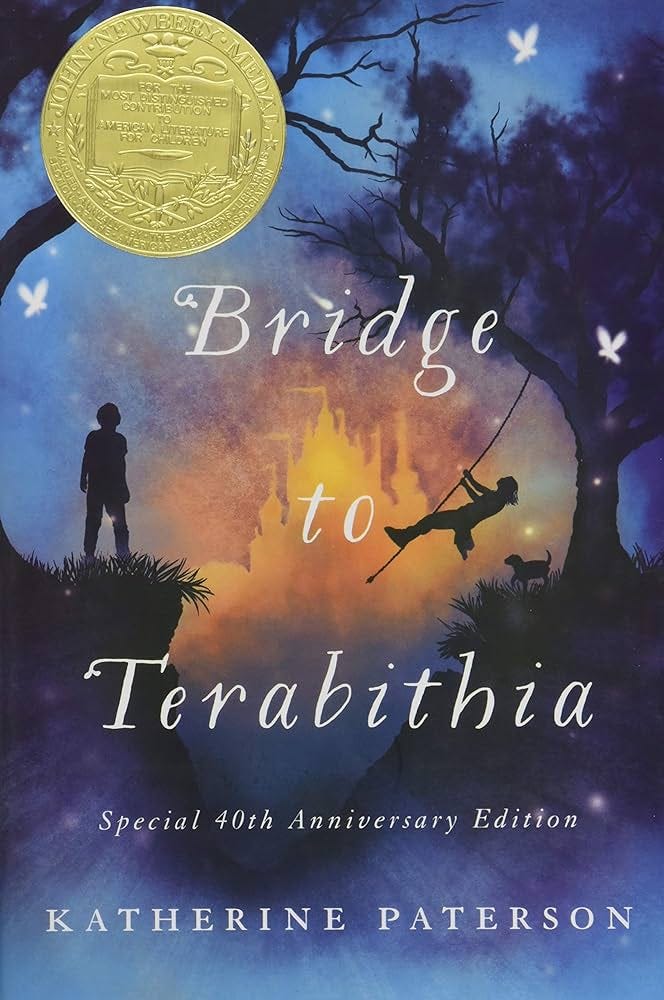Greetings, bibliophiles!
Today, I’m very excited to bring you
.Nicholas writes
, where he shares writings about life as a successful playwright, and the pop culture that made him.Here, Nicholas shares the book that showed him the true power of stories. enjoy!
—
I've always loved to read. Even when I didn't know how to, you could always find my nose in a book—lost in picture books made for a curious developing mind or blankly staring at my mother's college textbooks, mimicking how she would read under her breath while she studied for her college courses. "Blah, blah, gibberish, gibberish," I would exhale, sounding like a yoga class ujjayi breath. I learned to read when I was four—a fact my mother is very proud of—and read so much that by nine, I was so nearsighted I needed glasses. But it wasn't until the following year, at 10, did I truly understand my love for books and the power of stories.
It was fifth grade. The year I first discovered that everyone saw me as the chubby Brown kid, and when white boys who played soccer would start bullying me for being kinda gay (they knew before I did!). My favorite books, like The Adventures of the Bailey School Kids by Marcia T. Jones and Debbie Dadey, were still innocent and lighthearted. Books were for fun, so when Mrs. Del Amo assigned Katherine Paterson's Bridge to Terabithia, I was unfriendly about it.
The book was a hardcover, dented with scratches like a child had dug their nails into it. With its autumnal color scape, the cover depicted two white kids at the center, barefoot, leaning against a tree trunk. Growing up in a Filipino household, we didn't even go barefoot inside our house. "Where are your tsinelas?!" my Grandma would nag, chasing after me with her wooden spoon if my bare feet touched her floor. I knew I would hate Bridge to Terabithia because, even then, in the early aughts—before it was chic to care about representation in literature—I knew that white kid problems weren't for me. But, growing up Filipino, another thing that could inflict the fury of an immigrant mother's wooden spoon was doing poorly in school. So, I begrudgingly read the book.
Bridge to Terabithia was twice the size of a typical The Adventures of the Bailey School Kids. It was intimidating, and each chapter seemed endless. The book follows two kids, the angry and depressed Jesse and the bright and full-of-life Leslie, who create a magical forest kingdom in their imaginations called Terabithia. The book sounded fun, but it wasn't because Jesse and Leslie only played pretend to escape their very real-life issues. Everything I chose to read up to that point was all fantasy and supernatural—my favorite Bailey School Kids book was called Vampires Don't Wear Polka Dots. Bridge to Terabithia forced me to face real life on the page in ways I never had before.
For the first time, the characters and story were all rooted in realities that could exist where I do, and the freedom with which they lived their lives was unrelatable. As a child of immigrants, I grew up sheltered because, as Asians, our version of America differed from most. My family helicoptered over me to shelter me from the culture and country that hurt them when they immigrated, assimilated, and tried to start over. Their belief was that the prejudice they faced would come for me too. But as I see it now, the cost was that because they held me so close, I didn't know how to value myself or fit in on my own.
"You are the only kid in this whole durned school who is worth shooting,” Leslie tells Jesse when he defends her after a playground squabble with a bully.
I never read Bridge to Terabithia after my assignment to it. If I'm being honest, I only really remember two distinct parts. Leslie's statement was the first one. It confused me why Leslie wanted to shoot Jesse after he saved her from her bully. Mrs. Del Amo had to decipher its meaning to me, "At first glance, it’s violent, but then there’s the word 'worth,'" she lectured. "The word 'worth' tells us Leslie's message is of admiration."
This was the first time I was introduced to the value of self-worth and friendship. To Leslie, Jesse is the only person in their school who is worth the thirty cents it costs to buy a bullet. I spent much of my youth tethered to the idea of that sentence and questioning who was worth a bullet. At 10, nobody was, and that's when I realized for the first time I was lonely. In my teens, I started to wonder if I was worth a bullet, and that's when I realized I was lonely because I never believed I had worth.
Being American in an immigrant family, you're seen as a threat. It begins when you form ideas that go against custom. Then it grows when your behavior entices worry, and your actions mirror those of the people your family fears. Yet coming from an immigrant family yearning to fit in with the world around you, it's the same thing. Either way, you're different, and the world never lets you forget it. Leslie's line in Bridge to Terabithia didn't give me self-worth, but it showed me that self-worth was meaningful and something to strive for.
Less hopeful than the desire for worth, the second distinct part of the book was Leslie's death. Leslie dies when she hits her head and drowns swinging on a rope to cross a creek—this was their way to entering the imaginary kingdom of Terabithia. This was the first time I remember being affected by death.
I've always been full of feelings. I'm a Cancer—it's written in the stars that I'm overly emotional. But feelings in my household were luxuries. My Grandma used to balk at frivolity and say, "That's for Americans!" The privilege of expressing your emotions—good or bad—was more foreign to me than not. So when Leslie's death brought me to tears, I felt torn apart in a way I didn’t understand.
I never had meaningful friends, and I'm an only child. Which is why books were always so essential to me. The stories protected me from the ugly world, and the characters were my friends. Losing Leslie was losing a friend. It was the first time I comprehended the sadness and finality of death. The first time I encountered grief. The first time I realized that dying didn't singly mean of old age and that it could happen to me too.
Bridge to Terabithia introduced me to emotions and ideas someone that age needed to know: the value of worth and friendship and an understanding of grief and loss. The growth it ignited in me made going back to the books I always treasured difficult. It was never the same because Bridge to Terabithia taught me how to read by showing me that stories matter, that words can have considerable meanings, and that literature can torch change in you. Bridge to Terabithia made reading less fun but more vital because now, every time I read, I hope to gain or even lose something—I crave the pain of a bullet. The year I read Bridge to Terabithia, books evolved from being my shield from the world into being my key to it. And even though I hated being forced to read it decades ago and wouldn't even call it a favorite today, it is one of the most important to me.
P.S. For more ways of getting your writing in front of new readers, consider becoming a paying subscriber today.








A book that also made a mark on me reading it in school.
Yes, " I crave the pain of a bullet". We read for many reasons but one is to learn and experience emotions.